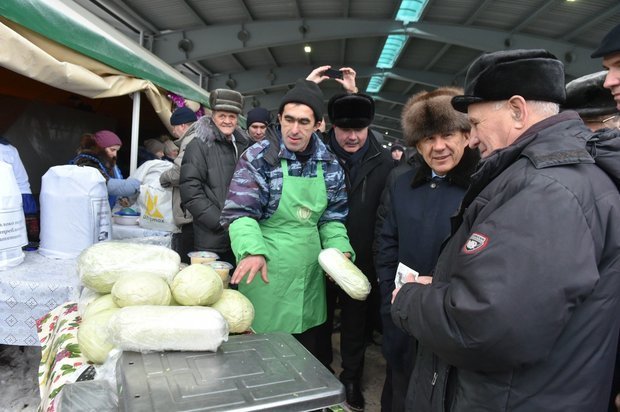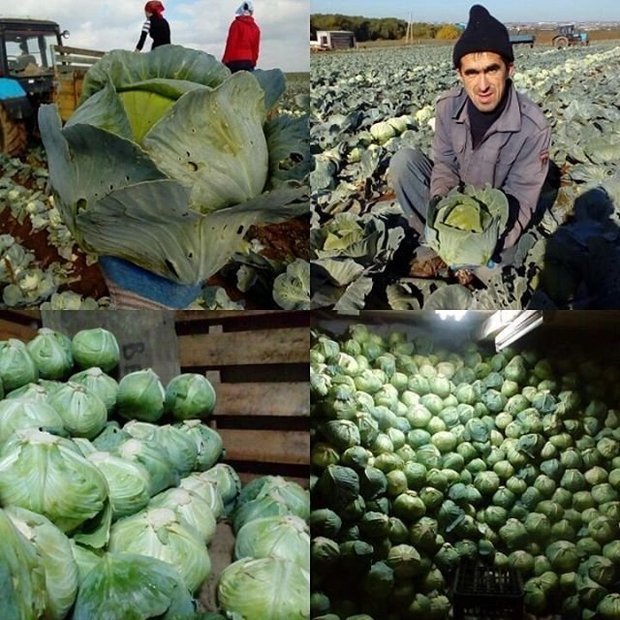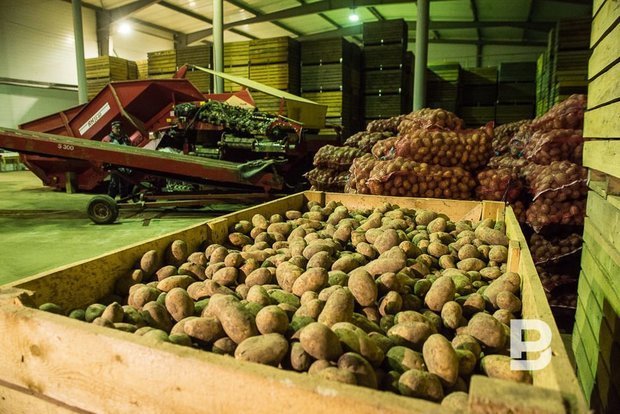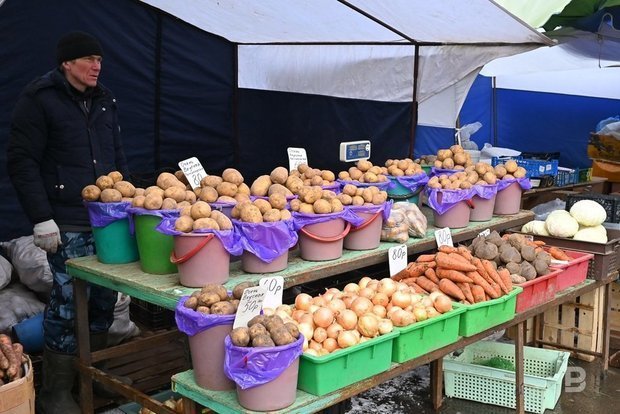‘They told me: how is it possible to grow napa cabbage in Arsk?!’
Tatarstan farmers ask for support for the production of potatoes and other vegetables

Vegetable growers of Tatarstan are waiting for the expansion of measures to support producers of potatoes and other vegetables. According to the Ministry of Economic Development of Russia, not only small and medium-sized enterprises, but also self-employed and citizens who run personal subsidiary farms can count on subsidies under the new federal project “Development of vegetable and potato growing”. Our republic is located in a zone of risky farming, but Tatarstan farmers have learned to grow even unusual for our area crops. The only problem is with machinery, “it is urgent to produce Russian equipment for vegetable growing," farmers ask. Read the details in the material of Realnoe Vremya.
“It sounds like fiction!” the president did not believe me
Nafil Gataullin, a farmer from Arsk, started his business back in the 1990s. At first, he collected vegetables from farms and sold them, then he began to grow root crops himself.
His farm is located in the village of Ayvan, the agrarian cultivates about 70 hectares of land. This year, I have planted potatoes, carrots, and cabbage in approximately equal parts.

Besides, the farmer grows a rather rare crop for our area — napa cabbage. Many doubt that this is possible, the owner laughs:
“When I started growing napa cabbage and began to exhibit my harvest at fairs, many did not believe that it could be grown on our lands. There was such a case when I participated in a fair in Kazan, where distinguished guests came, including Rustam Minnikhanov. Marat Akhmetov was then Minister of Agriculture. They came up to our counter, and I started telling them where I run the farm, how I grow napa cabbage. Then the president looked up at me and laughed with the words: 'Well, it sound like fiction! How is it possible to grow napa cabbage in Arsk?!' In general, he didn't believe it. I say: 'My fields are not far from the road to Tyulyachi, you often fly here by helicopter. When I'm weeding my napa cabbage, you're welcome to come, I'll meet you as a dear guest.”

According to Nafil Gataullin, this year the first harvest of napa cabbage has already been picked. Now the second batch has been sown. Fifty acres are allocated for this crop on the farm. “There are a lot of peculiarities in the cultivation of this crop. If the variety is incorrectly selected or if the crops have experienced even the slightest stress, the cabbage immediately begins to bloom," the head of the farm explained.
“Europeans also want to eat”
“Until recently, I ordered almost all seeds from abroad, most often from Holland. We are accustomed to these varieties. This year, I could not find the right variety in Russia. Such that it gives small cabbage heads suitable for sale. We are still continuing to purchase foreign seed material. At least this year, I managed to get seeds from Europe — Europeans also want to eat. Politicians do their job, entrepreneurs do their own, it has always been and always will be. But due to the complexity of logistics, the price of seeds has increased by about 20-30%," says the farmer.
Nevertheless, he had to use Russian varieties as well. For example, he tried to plant a new variety of cabbage last year. It showed itself on the good side, noted Nafil Gataullin, complaining that while there is not enough variety of varieties, there is still work to be done on this.

According to the head of the farm, farmers learn about new varieties at seminars for vegetable growers, but in Tatarstan they are almost not held at all: “I take part in seminars at the federal level. I plan to attend several more such events at the Russian level in the near future. We are introduced to new varieties, we study them and can continue to grow them in our fields. It is a pity that Tatarstan does not hold seminars on vegetable growing at all.”
A huge problem with with equipment and personnel
The vegetable grower uses Russian equipment in his farm, in particular tractors. But there is practically no equipment for planting and harvesting root crops of domestic production, he complained:
“My equipment has always been Russian, I worked on our tractors. I have never bought equipment from abroad. But there is a huge problem with the equipment. It was supplied almost entirely from abroad. For example, seedling machines. They used to be bought in Poland. There are such in our country at all, equipment for small farms is simply not produced. I always tell this. Both at exhibitions and at meetings, I appeal to representatives of factories: “Well, make such equipment for small farms already!”
According to him, the same problem is with the equipment for harvesting potatoes. The farmer managed to buy small Polish combines for harvesting “the second bread”, although not new. “There are no Russian analogues of cabbage harvesters — they are simply not produced. The same is true with irrigation equipment — we now have, for example, Italian. We are not complaining so far, repairs are not particularly required. Fortunately, it still works. But time is passing.”
Another big problem is a catastrophic shortage of personnel, the farmer noted. This year, in search of workers, he had to go to another region.
“You can plant a lot of hectares, but who will work on them? Now we work on the farm with the whole family. There are no permanent employees. If possible, we involve third-party employees. This is very problematic. Now many are ready to come to work only for a lot of money. They want at least 2,5 thousand rubles a day, some ask for 3 or 4 thousand. But such costs make it unprofitable to grow vegetables. No one gives us guarantees on the final price. There is no certainty that large labour costs will be fully justified," explained the head of the farm.
The farmer explained that since he does not use chemicals to treat weeds, he has to weed potatoes by hand. He gathered workers from the villages: “We go ourselves, recruit women, bring them to the farm, feed them, then take them back and pay. This year, I have had to do this for almost 10 days," he said.

The owner complained that now young people especially do not want to work on the land. “I am ready to pay a schoolboy a thousand rubles a day to weed the beds. This practice was also in our household, and this year the students have gone out several times, but it didn't last long. During the summer holidays, the schoolchildren of our village could earn extra money. But the desire to work in modern children is not particularly observed," he noted.
As for sales, the farm has established contacts with local stores in the Arsky district. Besides, the products are sold at one of the markets in Kazan. It is very problematic to work with large retail chains, the farmer admitted:
“The price of vegetables is always unpredictable. You can't predict it. Today, early cabbage is expensive in stores. It is sold for about 55 rubles per kilogramme. Our selling price is much lower. We sell it for 20 rubles per kilogramme. It is almost impossible for small farms to work with large retail chains. No matter how much we try to establish normal relations, we cannot do it. First, they need volumes and constant supplies. Besides, networkers always dictate their price. Therefore, manufacturers cannot get a special profit from working with such stores. This year, we plan to work with budget organisations. However, we need to try hard there too, for this we need to follow the tenders, but it's worth a try.”

“It is much easier for large companies to get help from the state”
Every year, vegetable growers receive subsidies from the state. But, as the farmer said, it is much easier for large farms to get help from the state:
“Farmers engaged in vegetable growing receive a so-called per-hectare subsidy. This money comes every year. We haven't received any money yet this year. It is much more difficult for small farms to receive payments from the state. To receive a subsidy, you need to fill out many documents, meet many requirements. These requirements are getting tougher every year. We usually received a subsidy from the state every year, either in the spring or in the summer. This year they promise by autumn.”
Irek Sadykov, the head of the Department for the Development of Agricultural Industries of the Ministry of Agriculture and Food of the Republic of Tatarstan, told Realnoe Vremya that the first part of subsidies to small farms has already been paid:

The government promises to support vegetable growers
The Ministry of Economic Development reported that the Russian government is going to expand measures to support producers of potatoes and other vegetables. According to the Ministry of Economic Development of Russia, not only small and medium-sized enterprises, but also self-employed and citizens who run personal subsidiary farms can count on subsidies under the new federal project “Development of Vegetable and Potato Growing”. The decree was signed by Prime Minister Mikhail Mishustin.
The subsidies will be provided for carrying out agrotechnological works, for the production of vegetables, including elite varieties, in open and protected soils — in greenhouses and the greenhouses using additional illumination technology.
Another change concerns agricultural producers who are building or upgrading vegetable storages. They will have the opportunity to qualify for a subsidy covering three-quarters of the cost of the work. The selection of projects will be handled by a special commission of the Ministry of Agriculture.
The new federal project “Development of Vegetable and Potato Growing” was launched at the beginning of the year. The new norm on increased subsidies for the construction and modernisation of vegetable storages is to take effect from January 1, 2024.